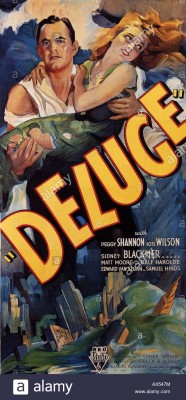| Reviews & Columns |
|
Reviews DVD TV on DVD Blu-ray 4K UHD International DVDs In Theaters Reviews by Studio Video Games Features Collector Series DVDs Easter Egg Database Interviews DVD Talk Radio Feature Articles Columns Anime Talk DVD Savant Horror DVDs The M.O.D. Squad Art House HD Talk Silent DVD
|
DVD Talk Forum |
|
|
| Resources |
|
DVD Price Search Customer Service #'s RCE Info Links |
|
Columns
|
|
|
Deluge (plus Back Page)
Seen today, some are sure to be disappointed that all of Deluge's spectacular destruction is confined to the 70-minute movie's first 18 minutes, "after which nothing remotely as exciting happens," as pal DVD Savant puts it. True enough, but I found Deluge pretty gripping throughout. Though dated and melodramatic a lot of the time, it was nevertheless without precedent, thus completely lacking the predictability of most cheap early talkies. Made before the enforcement of the Production Code, it's also more realistically violent and sexually explicit, and hence more honest with its subject matter than it could have been had it been made just a year-and-a-half later. As for the special effects, they're huge scale for a movie in this budget range, and for audiences willing to suspend disbelief they're almost incredible.
A Kino release of Lobster Films' restoration, the new Blu-ray includes a second, equally obscure Back Page (1934), starring Deluge's top-billed Peggy Shannon.
Weather patterns throughout the world experience stark, inexplicable changes. Meteorologists and astronomers based in New York learn that landmasses throughout the world are crumbling in a series of violent earthquakes and tsunami waves. Soon, Manhattan itself is destroyed utterly.
Upstate, lawyer Martin Webster (Sidney Blackmer) comes to terms with the apparent drowning deaths of his wife, Helen (Lois Wilson), and their two children. He's gathered supplies in a tunnel (played by Bronson Caverns, aided by matte and/or glass shots) and a nearby shack close to the new coastline. Not far away, Jepson (Fred Kohler) and Norwood (Ralf Harolde) have done likewise when they discover an unconscious woman on the beach, Claire (Peggy Shannon), a world-class long-distance swimmer. Beefy Jepson murders timid Norwood over his supposed rights to the girl, and she swims on, eventually found, again unconscious, by Martin. Jepson joins a gang of marauders to kidnap Claire, but she and Martin, by now in love, fend off their attackers. Just then another group of men from a nearby town trying to rebuild civilization discovers them. In the half-destroyed village Martin learns that his wife and children are still alive.
Loosely adapted from S. Fowler Wright British 1928 bestseller, the movie of Deluge somewhat retains Wright's anti-Wellsian thoughts on scientific advancement: in Deluge the survivors aim for a less-cluttered, nobler rebuilding of society, which in Wright's novel are built on the ashes of a corrupt class structure and dangerous preoccupation with and reliance of technology to solve man's problems.
The movie is more melodramatic, with Martin too easily coming to terms with the seeming death of his wife and children (Lois, significantly, is convinced Martin is alive), falling in love with Claire, then literally instantly walks away from that relationship once he learns Lois and the kids survived. In contrast to Ray Milland's hardened patriarch in the later Panic in Year Zero (1962), Martin sets up solitary housekeeping without incident or much expressed concern, and though a lawyer by trade has little difficulty keeping Jepson's brigands at bay. Almost as soon as he arrives at the town they nominate him to become their leader.
Third-billed Sidney Blackmer, better remembered as a fine character actor (often in sinister parts) than as a leading man, looks out of place. With his wall-eyed, pinched features and flabby physique, he's definitely not a good fit. Peggy Shannon, one of dozens of early talkie stars who seemed to succumb to alcoholism, obscurity, and early death, fares much better. Believably athletic and resourceful, her performance here also has a naturalness that complements the material.
The opening two reels are as spectacular as expensive features like Things to Come and San Francisco, made by big, established studios. The vast miniature landscape of Manhattan is extraordinarily detailed, and destruction on this scale wasn't attempted again until Japan's Eiji Tsuburaya did similar work in pictures like Godzilla (1954) and the regrettably unavailable (in the west) Gorath (1962). The fever-pitched montage building up to the money shots is equally impressive with its tense editing and underscoring, and while some individual shots (mostly crude travelling mattes) don't come off, it's a marvelously visceral sequence that probably terrified 1933 audiences, and clearly an influence on the American and British films noted above. Further, the remainder of the picture likewise offers some nice effects shots, mostly mattes and/or glass shots, and the producers didn't skimp in the later scenes, populating the town with many extras and in making it appear half-destroyed itself.
Conversely, the low budget does otherwise betray the polish in other, clumsy moments, most glaringly during the big fisticuffs between Martin and Jepson, during which Blackmer's obvious toupee nearly falls off and the actor, between blows, vainly attempts to stick it back into place.
Over the decades the movie became impossible to see; a handful of tantalizing stills intrigued genre fans for years. Republic bought the film to mine its effects scenes for use in their serials but never reissued the complete movie. An Italian-dubbed print eventually turned up and was released to VHS some years ago, but this is the first time in 80-plus years viewers could see Deluge as intended.
The picture is refreshingly frank in depicting how difficult life would be for any younger women lucky enough to survive the initial catastrophe. Threats of rape abound, and the picture makes plain that Jepson's band has gang-raped and murdered a woman whose body Martin finds. The film's downbeat ending (intended as ambiguous?) goes so far as to suggest that even Martin prioritizes his need for female companionship above any lasting commitment to Claire once the long-lost family turns up. In an honestly written monologue he clumsily attempts to explain and justify his conflicted emotions, but abandons her all the same.
Video & Audio
The black-and-white, 1.37:1 Deluge looks great considering the picture was almost lost to the ages. Lobster Films sources a dupe negative discovered in France. The resulting transfer is way above average for a 1933 title, despite minor and never distracting imperfections. (But what is that fleeting image of the Statue of Liberty doing between the RKO logo and the opening titles?) The audio is also excellent, considering. Region "A" encoded.
Extra Features
Supplements included an exhaustively researched audio commentary by Richard Harlan Smith that packed with good and useful information.
An entire second feature, 1934's Back Page is presented in high-def as well. Deluge's Peggy Shannon stars as a talented and resourceful reporter who becomes a small-town editor after her New York publisher kills a story to appease a rich associate. In contrast to the Glenda Farrell-type wisecracking Lois Lane types, the movie is more realistic and earnest in its proto-feminist portrait of a woman trying to prove her worth in a profession heretofore dominated by men. (Even in the late 1970s series Lou Grant, its star female reporter had to climb her way out of the "women's" section and, initially, was scoffed at for her sex.) Though it loses its way toward the end, Back Page is another impressive early indie, well above average.
Parting Thoughts
Fascinating in its subject matter and execution, Deluge is a DVD Talk Collector Series title.
Stuart Galbraith IV is the Kyoto-based film historian largely absent from reviewing these days while he restores a 200-year-old Japanese farmhouse.
|
| Popular Reviews |
| Sponsored Links |
|
|
| Sponsored Links |
|
|
| Release List | Reviews | Shop | Newsletter | Forum | DVD Giveaways | Blu-Ray | Advertise |
|
Copyright 2024 DVDTalk.com All Rights Reserved. Legal Info, Privacy Policy, Terms of Use,
Manage Preferences,
Your Privacy Choices | |||||||













